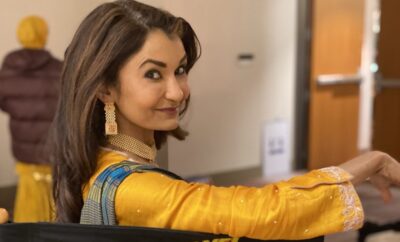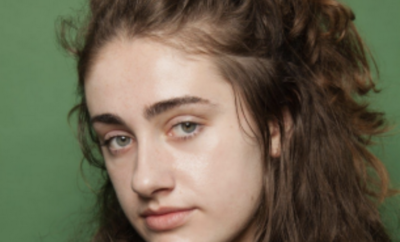
Movie Reviews
Born Again This Way – Outfest
By: Taylor Gates
“Born Again This Way” highlighted the fascinating—sometimes messy, sometimes beautiful, sometimes both—ways that identifying as queer and being part of a faith group can both coexist and conflict. Hinduism, Judaism, Islam and Christianity are just a few of the religions represented in the seven short films. Each offered a balanced and unique perspective, never sugarcoating nor bashing any culture or belief system. The “Born Again This Way” program never feels like propaganda, but instead sophisticated storytelling with characters that surprise and transcend generalizations.
The Most Beautiful Butterfly
Clocking in at under five minutes, The Most Beautiful Butterfly is a snapshot of a film. A transgender Hindu woman performs a sacred religious ritual before putting on her clothes and makeup, going into the world as her true and gorgeous self.
The short film has no dialogue, its strength lying in its visuality and music instead of plot. The set design is gorgeous, rich with dark, warm colors. The woman lights candles, smoke rising into the air as traditional music plays in the background. Even the title sequence is elegantly crafted. “The Most Beautiful Butterfly” is written in a cursive font, bold colors slowly morphing into each other like a lava lamp.
Mukesh Vidyasagar served as a director, writer, producer and editor for this project. Though simple in concept, the short film is solid in execution. Deciding to focus on this one person during this split second in time, Vidyasagar suggests that this woman is not alone in her desires, hinting that there are many others like her. She is but a microcosm of her culture.
Summer
Writer/director Pearl Gluck decided to set her young adult film in one of the most classic and timeless environments—a sleep-away camp. Instead of discovering an identical twin like in The Parent Trap, though, the lead girls Shani (Juliet Brett) and Bayla (Emmy James) start to discover their sexuality. Instead of getting into ultra-raunchy hijinks like in Wet Hot American Summer, the girls spend most of their time studying religious text under the watchful eye of Mrs. Schoen (Thea McCarten).
Though the two are opposites, Shani being the timider and more reserved of the two while Bayla is the more fearless and wild, they complement each other – remaining best friends while going through puberty. They gossip about Shani sneaking off to see a boy, play board games with the other girls, go swimming in the pool and sit together during lessons about remaining pure in order to find a good “match” or future husband.
One night, however, Bayla steals a banned copy of the book Our Bodies, Ourselves and a bottle of wine from a wedding party. She and Shani sneak off to a hidden cabin to read the forbidden book and drink the forbidden alcohol. Buzzed and with piqued curiosity, they begin to touch each other, using the excuse they are getting learning about how sex works so that they’ll know how to please their partner someday. However, they both clearly feel a spark, which scares them.
The next morning, Bayla runs off, stashing the bottle in a shrub, but it is found by a groundskeeper and reported to Mrs. Schoen. Mrs. Schoen finds Shani, now alone and upset in the cabin, and asks her both where the wine and book came from since this rebellious behavior is not normal for her. Shani trepidatiously asks if a girl can have a crush on another girl, but Mrs. Schoen assures her that’s not possible and that she’ll truly love a boy someday.
Both Brett and James play their characters with a convincing mix of maturity and naivety, edge and innocence. The most intimate scenes are equally awkward and romantic (and suggestive without being gratuitously sexual, thanks to Gluck’s tasteful and age-appropriate direction) and they both impressively and fearlessly commit to the moment. McCarten, too, shines as the teacher. She is both strict and sweet, stern and soft, somewhat progressive in some ways but hopelessly outdated and restrictive in others.
This female-centric film is such a breath of fresh air and the chemistry between all of them at the camp feeling incredibly authentic and natural. The setting and colors are warm, fitting with the film’s title. Even those without knowledge of Hasidic traditions will be able to relate to these characters. It’s hard not to fall in love with all of them in their own ways, flaws and all, in just eighteen minutes. I would love to see an expansion of the story with these same characters.
Noora [Norwegian with English subtitles]
Noora (Dagny Backer Johnsen) is leading a relatively normal life in a small Norwegian town, living with her very Christian parents and occasionally sneaking away to another town to visit her secret girlfriend Siv (Sacha Slengesol Balgobin). One morning, Noora is blindsided by her father announcing that she is set to marry older man Johannes (Thor Brekkeflat)—no discussion. Noora is devastated, bussing into Siv’s town in order to pick up her wedding dress and say a final heartbreaking goodbye.
Johnsen is wonderfully expressive and convincing as Noora, able to convey intense emotion with her eyes alone and contort her face into anxious devastation. Balgobin does well playing opposite her, crushed but trying to be strong for Noora.
Though they’re only in the movie for a small section towards the beginning, Noora’s parents sell their small conflict as well, giving tons of insight into the dynamics of the household in a short amount of time. (The father is clearly the dominant, temperamental head-of-the-household, obvious by his slamming his fist on the table when Noora starts to protest the marriage. The mother is softer and more understanding, shooting Noora sympathetic glances over the table.)
Nils J. Nesse’s cinematography is superb, focusing on crisp whites and cold blues and grays with the exception of Siv’s symbolically significant bright red hat. Johnsen and Balgobin’s chemistry combined with Tommy Næss’s direction makes for a beautiful, hopeful love story. The surprising—but earned—ending is guaranteed to make you smile and clearly shows Noora’s character development and dynamic nature.
Ablution (وضوء)
Whereas the “All About My Mother” short program centered around mother/child relationships, Ablution switched gears a bit to focus on a father and son duo. Waleed (Omar Al Dakheel) spends most of his day taking care of his traditional and religious father Khaled (Jay Abdo), who is now confined to a wheelchair.
At night, Waleed will go out to meet Mark (William Austin Speis), who isn’t too keen on sneaking around but reluctantly agrees to do so for his boyfriend’s sake. One night Khaled sees Waleed and Mark kissing out the window and explodes on Waleed, telling him he wishes he was never born and yelling at him to get out of his house.
Ablution is an undeniably intense film. Dakheel and Abdo do an excellent job, especially during the most brutal of scenes. Khaled’s outburst is harsh but (unfortunately) believable, never feeling too high-volume or melodramatic. Waleed takes it mostly in silence but doesn’t feel like a doormat, either. His small actions, such as when he turns off the music box on the fireplace playing the classical Islamic music, shows he has a very different relationship with faith than his father and that he is mainly continuing to pray for show to appease his dad.
Dakheel is a quadruple threat, acting, writing, directing and producing the film. One line especially really stuck with me and highlighted the gray zone of the topic: “I don’t think that being gay is wrong,” Waleed tells Mark in the car after Mark is frustrated that he still wants to sneak around. “But I respect my father.”
Dakheel also writes in a twist ending—one that feels slightly too convenient but acceptable, getting the job done, especially since it sets up and allows for a subtly optimistic, character-appropriate ending. The plot comes full-circle, both beginning and ending with Waleed helping Khaled prepare for prayer, neatly but realistically wrapping up the journey.
Deviant
Taking place in the early 60s when conversation therapy was a common occurrence, Marcel (Rudy Pankow) hesitantly agrees to undergo conversion therapy after his mother (Krystina Montemurro) catches him masturbating to bodybuilder magazines. The film skips around in space and time, quickly transitioning from the present-day scene with the conversion therapist (Mike Burnell) to various church services.
Miserable from the conversion therapy but still wishing to participate in the church and save his soul from eternal damnation, Marcel bluntly asks Pastor Murphy (Court Rutter) if his homosexuality will cause him to go to Hell. Caught off-guard, the pastor asks Marcel what he thinks. Marcel says honestly that he doesn’t think God would actually punish him forever just for being who he is and the pastor confirms this, stating that good works and a belief and God are the things that truly matter. This mother overhears this conversation, and though the movie ends before we see anything else, it is implied that she takes these words to heart as well.
Alex Niknejad’s cinematography, Ethan Garcia’s colorization, and James Hall and Benjamin Howard’s editing made the film sleek, snappy, and visually stunning. The colors are full and bold, and the costuming and props are beautiful and authentic to the time period.
The acting is convincing—the conflict and desperation comes through in Pankow’s performance, the creepiness is apparent without going too over-the-top with Burnell and Rutter’s pastor is a young, hip friend it would be easy to confide in. Montemurro does a wonderful job silently portraying the suffering mother who is trying to do what’s best, but one can’t help but wish she was given a larger role to add some more depth and a female voice.
Hall and Howard’s script borders on PSA at times, but the fresh, uplifting message it ultimately sends trumps any qualms about that. The inclusion of statistics about conversion therapy still being used today at the end of the film is shocking, ensuring that this film will go above art and cause a spur to action for its audience.
Wren Boys
Wren Boys is one of the most unexpectedly funny, poignant and overall surprising short films in the entire Outfest lineup. The day after Christmas, Conor (Lalor Roddy), a Catholic priest, drives his nephew Seamus (Diarmuid Noyes) to prison. It slowly unravels that the reason why is that he is going to marry his boyfriend Malky (Fionn Walton), who is being held there.
Conor and Malky, though very different people, have a close and touching relationship. They joke about smoking in the car and Seamus teases a constantly good-natured Conor about potentially getting kicked out of the priesthood for performing the matrimony. There’s a particularly funny moment where, in the waiting room, quick-tempered Seamus gets into a curse-filled argument with a woman named Seana (Carrie Baxter) after she takes sneaky photos of them with her iPhone. The characters feel real, their situations trivial but impossible not to get invested in.
Wren Boys is also impossible to predict, never more effective than during its final moments. After their marriage ceremony, Malky video chats Seamus outside the jail, showing him his cellmates beating him up while he cries for help. Seamus panics, wanting to run back inside and save him from the homophobic and violent activity. However, it all just turns out to be an elaborate prank orchestrated by Malky with his wicked sense of humor…having his buddies pretending to assault him while in reality writing “Just Married” on his back in marker.
I heard the entire theatre breathe a collective sigh of relief when Malky was in the clear and laughter filled the audience when Seamus joked that he was going to divorce him immediately. Just as soon as the audience relaxes, though, a true act of violence comes out of nowhere. While Conor is walking to his car, a man comes out from behind a building and hits him in the face with a crowbar. We are left with the image of Conor lying on the ground, bleeding and unmoving. You could hear a pin drop as the credits begin to roll, hearts racing, startled.
Wren Boys not only makes a statement about individuals being able to be progressive and accepting but also shows that sometimes it is the most unexpected of places—the most harmless-seeming of people—who are those capable of true violence. And sometimes it’s the outcasts and ones we write off as being less-than who are the most open ones of all. Harry Lighton and John Fitzpatrick’s script and Lighton’s direction offer points of view not often seen and I applaud their brilliant script for making people feel something, for not being afraid to take big risks, and for daring to make a real statement.
Would You Look at Her
A stubborn tomboy (Sara Klimoska) in Macedonia is having a rough week. Her phone gets run over by a bus, her family’s television breaks, she’s getting bullied at school for her close relationship with her female best friend and her father is still sick. Fortunately, there’s a religious ritual coming up that includes diving into a freezing-cold lake for a cross, which she sees as a solution to all of her problems. The only problem? Traditionally, only males have been allowed to participate…but do you really think that’s going to stop her?
The lead character in Would You Look at Her is exactly the hero we need right now: daring, fearless, strong, and an all-around badass. Klimoska plays her with an ambitious, determined ferocity and discipline not seen onscreen since Gal Gadot’s turn in Wonder Woman. Still, there’s a typical teenage anxiety there fluttering under the surface, making her performance all the more believable. She’s impossible not to root for.
This film won the award for Best International Short at Sundance and I can absolutely see why. Writer and director Goran Stolevski sure has had plenty of practice, this being his whopping 24th short film in this young life.
Stolevski’s experience shows and has certainly paid off. He manages to pack an impressive amount of plot and character together in just twenty minutes, yet it never feels overstuffed. He weaves subplot after subplot into the colorful rug, making it look easy.
Would You Look at Her accomplishes everything it sets out to do and more. Focusing on the cross-diving tradition, the film’s dramatic background is both fascinating and informative. For all the film’s serious messages and tones, there’s a surprising amount of humor (such as when priest slips into the lake, which sets off a flurry of frenzied activity) and a lightheartedness that makes the film both impactful and a lot of fun.





You must be logged in to post a comment Login